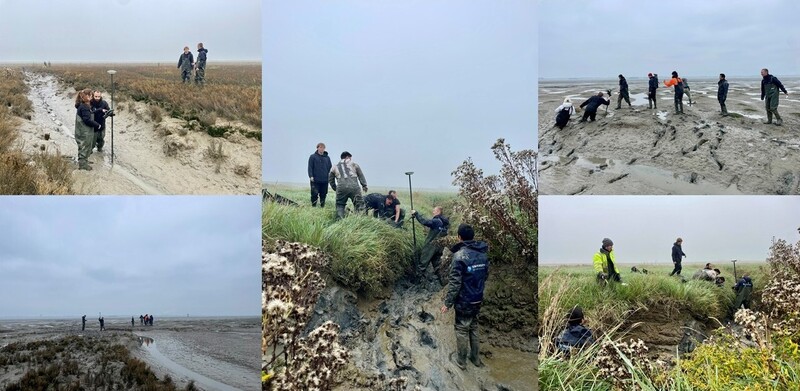Yara Maljers1, Jaco de Smit1, Chiu H. Cheng1, Laura Piedelobo1 & Wietse van de Lageweg1
1HZ University of Applied Sciences, Middelburg, The Netherlands
* Corresponding author: Yara Maljers yara.maljers@hz.nl
Introduction
As climate change accelerates the frequency and intensity of extreme weather events, delta systems face increasingly complex challenges. The Delta Patrol initiative addresses the urgent need for high-resolution data collection during these events to improve our understanding of their immediate and long-term impacts. Beyond hydrodynamics and sediment transport, the project integrates a social-scientific approach to examine how hands-on fieldwork shapes students' perceptions, motivations, and engagement as far as climate adaptation challenges are concerned. This aligns with the core themes of NCK, reinforcing the role of interdisciplinary education in preparing the next generation of coastal professionals.
Objective and Methods
Delta Patrol mobilizes a rapid response team of researchers and students to deploy advanced instrumentation, including ECO-ADCP and DGPS, to measure flow velocities and other critical parameters during extreme weather events. Field days are identified based on meteorological data (e.g., wind direction, speed, and water level predictions). Simultaneously, a structured social science methodology, comprising semi-structured interviews and field observations, is employed to assess how direct field experience influences students' perceptions of climate risks and their motivation to engage in coastal monitoring.
Results
Delta Patrol is currently focusing on the area of Zuidgors (Western Scheldt, The Netherlands), building on research by de Smit et al.[1] on the morphological effects of salt marsh rejuvenation. By integrating rapid response measurements, Delta Patrol provides critical insights into delta morphodynamics during extreme weather conditions, complementing longer-term monitoring efforts.
In addition to environmental monitoring, the study investigates how experiential learning during extreme weather events affects students’ risk perception and engagement with scientific research. Preliminary findings suggest that participation in rapid response monitoring enhances students’ understanding of climate change impacts, fostering a stronger sense of involvement in environmental challenges. Future analyses will explore the broader educational implications of Delta Patrol within the Delta Climate Centre (DCC) framework, as well as potential collaborations with research teams from TU Delft and Utrecht University.
Delta Patrol advances scientific methodologies for monitoring extreme weather impacts, while demonstrating the value of experiential learning in shaping future coastal professionals. By integrating rapid response science with education, the project contributes to both research and curricula development, reinforcing the importance of interdisciplinary collaboration in climate adaptation strategies. The initiative aligns with the growing global momentum for innovative, hands-on approaches to studying and mitigating extreme weather events.

Students from Delta Patrol conducting rapid response measurements at Zuidgors, deploying instrumentation ahead of an upcoming storm to capture the impact of extreme weather events on delta dynamics, while also gaining hands-on experience in coastal resilience.
References
[1] Smit, J.C. de, V.A. Bax, C.H. Cheng, B. Walles, & W.I. van de Lageweg (2024) Morphological effects of salt marsh rejuvenation in Zuidgors (Western Scheldt). Proceedings of the NCK Conference 2024. HZ University of Applied Sciences, Middelburg, The Netherlands.










